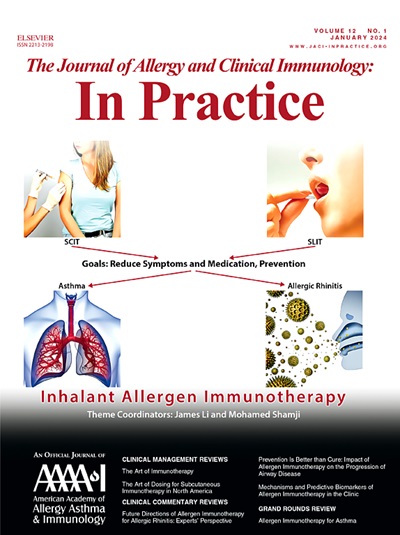Shared Decision-Making in Insect Sting Allergy: To Bee or Not to Bee?
IF 8.2
1区 医学
Q1 ALLERGY
Journal of Allergy and Clinical Immunology-In Practice
Pub Date : 2025-01-01
DOI:10.1016/j.jaip.2024.06.009
引用次数: 0
Abstract
Evaluation and management of insect sting allergy are often not straightforward when there is uncertainty about the history of reaction, the significance of test results, and the risk of severe reaction to future stings. Patients encounter misinformation about the chance of reaction and may have strong beliefs about the need for treatment. Shared decision-making encourages the clinician to listen to the patients’ concerns and beliefs, share relevant information and evidence, and partner with patients to incorporate their values and preferences. This review discusses some major decision points in diagnosis and treatment of insect-allergic patients, with attention to the potential burdens or harms that are important to patients and factors that relate to patients’ values and preferences concerning the choices they must make. This is especially true in patients with no history of moderate to severe sting anaphylaxis in whom the risk may be overestimated, but it can also be important in patients who underestimate the risk associated with severe sting anaphylaxis. Clinicians should become more knowledgeable about patient-important beliefs and outcomes and engage in shared decision-making to help patients understand and be comfortable with the choices they must make.
昆虫叮咬过敏的共同决策:蜂还是不蜂?
昆虫蜇伤过敏的评估和管理通常并不简单,因为患者对反应史、检测结果的意义以及未来被蜇伤后发生严重反应的风险都存在不确定性。患者会遇到关于反应几率的错误信息,并可能对治疗的必要性抱有强烈的信念。共同决策鼓励临床医生倾听患者的担忧和信念,分享相关信息和证据,并与患者合作,将他们的价值观和偏好纳入其中。本综述讨论了昆虫过敏患者诊断和治疗中的一些主要决策点,关注对患者而言重要的潜在负担或伤害,以及与患者必须做出的选择相关的价值观和偏好因素。对于没有中重度蛰伤过敏史的患者来说,这一点尤为重要,因为他们可能会高估蛰伤过敏的风险,但对于低估严重蛰伤过敏相关风险的患者来说,这一点也很重要。临床医生应更多地了解患者的重要信念和结果,并应参与共同决策,帮助患者理解并接受他们必须做出的选择。
本文章由计算机程序翻译,如有差异,请以英文原文为准。
求助全文
约1分钟内获得全文
求助全文
来源期刊

Journal of Allergy and Clinical Immunology-In Practice
ALLERGYIMMUNOLOGY-IMMUNOLOGY
CiteScore
11.10
自引率
9.60%
发文量
683
审稿时长
50 days
期刊介绍:
JACI: In Practice is an official publication of the American Academy of Allergy, Asthma & Immunology (AAAAI). It is a companion title to The Journal of Allergy and Clinical Immunology, and it aims to provide timely clinical papers, case reports, and management recommendations to clinical allergists and other physicians dealing with allergic and immunologic diseases in their practice. The mission of JACI: In Practice is to offer valid and impactful information that supports evidence-based clinical decisions in the diagnosis and management of asthma, allergies, immunologic conditions, and related diseases.
This journal publishes articles on various conditions treated by allergist-immunologists, including food allergy, respiratory disorders (such as asthma, rhinitis, nasal polyps, sinusitis, cough, ABPA, and hypersensitivity pneumonitis), drug allergy, insect sting allergy, anaphylaxis, dermatologic disorders (such as atopic dermatitis, contact dermatitis, urticaria, angioedema, and HAE), immunodeficiency, autoinflammatory syndromes, eosinophilic disorders, and mast cell disorders.
The focus of the journal is on providing cutting-edge clinical information that practitioners can use in their everyday practice or to acquire new knowledge and skills for the benefit of their patients. However, mechanistic or translational studies without immediate or near future clinical relevance, as well as animal studies, are not within the scope of the journal.
 求助内容:
求助内容: 应助结果提醒方式:
应助结果提醒方式:


